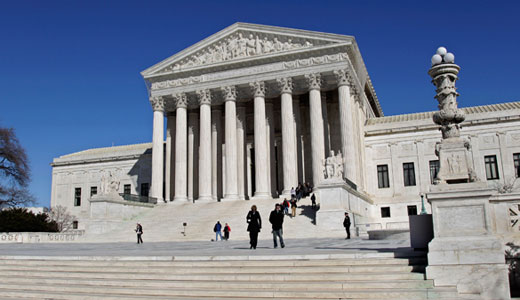
Rahnee Patrick is in a wheelchair. Suffering from several serious maladies since age 8 she needs caregiver Moira Johnson to help her bathe, dress and go to work.
But Johnson wouldn’t be there for Patrick if she didn’t get a living wage, thanks to her union, the Service Employees. Now, as became clear at a Jan. 21 Supreme Court hearing, the ability of SEIU and other unions to win that living wage is threatened.
“My personal caregiver came to me two weeks ago in a snowstorm,” Patrick said as snowflakes rapidly swirled on the Supreme Court plaza afterwards. “She gets a really good wage because of the union. When she’s stress-free, I’m stress-free.”
But the threat to living wages for Johnson and other caregivers, along with other public workers, comes because the justices heard a right-wing challenge to any public union’s ability to collect fees for representing workers whom contracts cover, but who aren’t union members, such as a group of caregivers for the disabled in Illinois.
And William Messenger, lawyer for the right wingers, the so-called National Right To Work Legal Defense Foundation, made clear its real agenda: To abolish union dues, in the name of the “free speech” clause of the U.S. Constitution’s 1st Amendment. That would rob SEIU and other unions of money they need to represent workers.
“There must be thousands and thousands of contracts across the United States with fair share provisions,” for non-union members whom unions represent, Justice Elena Kagan commented. “Do you doubt that these were core central provisions in the making of these contracts? That if these kinds of provisions were prohibited, the agreements would look fundamentally different in many ways?” she asked.
“The main difference is just the compulsory unionism clause in the agreement would be gone. But otherwise, the agreements would be the same,” Messenger said.
Officially, the case Harris vs. Quinn, is a challenge by a group of non-union home health care providers, especially providers serving the disabled, to an Illinois law that sets up the state as a joint employer with individuals who hire those workers. Then, if the workers unionize, they have an entity – the state – to bargain with.
The right-to-work group, which took over the case from the non-union workers, argued that even the lesser fees those workers pay to the union for basics such as contract bargaining and grievances violate the workers’ free speech rights.
Messenger went beyond that. He said because federal and state Medicaid money pays for home health care, the union is lobbying “on a matter of public concern,” while the 1st Amendment covers workers as individuals, not in a union.
“Illinois is forcing…thousands of home care providers to pay compulsory fees to the SEIU to petition the state about its Medicaid program that pays for their services to persons with disabilities,” he argued. “This violates the 1st Amendment.”
Justice Ruth Bader Gins burg asked Messenger: “Are you saying that when it’s in the public sector, it gets converted into something else?” “Yes, when-in the public sector-a group is petitioning the government for money, that is, petitioning the government over a public program,” he replied.
Attorney Paul Smith, speaking for Illinois, and for other states that let their workers unionize, told the justices “the government’s key interest is in its operations” and their efficiency. He reminded the justices that for almost four decades, the court has let states decide whether unionization promotes that goal.
The court’s past rulings curbed some 1st Amendment rights of non-union workers whom unions represent, but also said the non-unionists don’t have to pay full union dues, just agency fees, Smith pointed out. He also told Chief Justice John Roberts that while Medicaid may pay the overall bill, the state sets the wages for the workers – or even decides if they can bargain about wages at all.
Messenger tried to deny he really wants to destroy unions by depriving them of money, which means the unions could not fight for better wages for caregivers, or any other workers. The justices brought him up short.
“I suspect you cannot answer my question without accepting one of the following three propositions,” Justice Stephen Breyer told Messenger. “First, unlike every other employee, government employees have no right to organize. Or second, they have a right to organize, but they cannot bargain about wages, working conditions and hours unlike any other. Or, third, the courts are going to fashion, using the 1st Amendment as their weapon, a new special labor law for government employees. I’d remind you we have some experience on that in the 1930s where courts tried to do something analogous. Now answer my question,” Breyer bluntly said.
“I believe the interests here are insignificant…because the result will simply be that employees cannot be forced to support union representation,” Messenger replied. That didn’t convince Justice Antonin Scalia. “So you’re essentially destroying not just the shop, but you’re destroying the ability of the union to get money,” Scalia said.
Photo: AP

MOST POPULAR TODAY

Zionist organizations leading campaign to stop ceasefire resolutions in D.C. area

High Court essentially bans demonstrations, freedom of assembly in Deep South

U.S. imperialism’s ‘ironclad’ support for Israel increases fascist danger at home


UN warns that Israel is still blocking humanitarian aid to Gaza






Comments